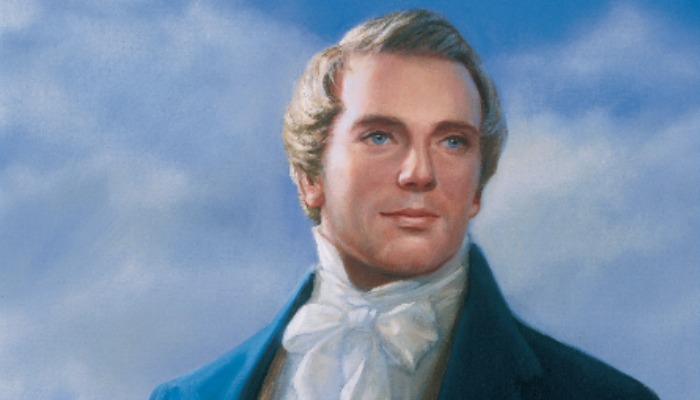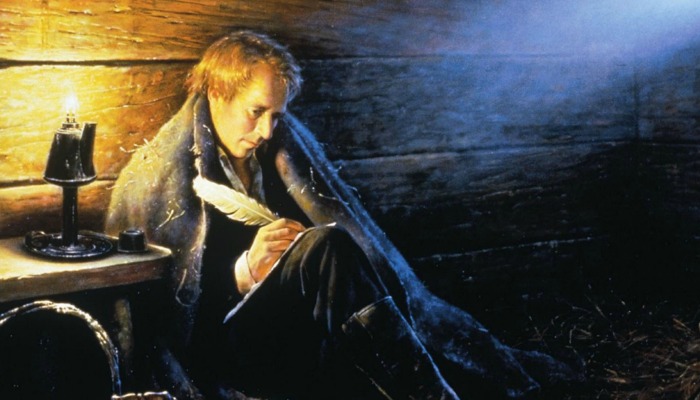Joseph Smith Wasn’t Who Everyone Thinks He Was
I’ll never forget learning about Joseph Smith in my 11th-grade American History class.
As a student — and especially as a teenager — it’s easy to take everything your textbook says as gospel. After all, they’re supposed to be impartial, well-researched, and completely factual, right?
Bad news: they’re supposed to be, but… Well, sometimes they’re not.
That day in class became the first time in my life I realized that you need to question what you read — and that even history (or more appropriately, how we perceive history) can get things wrong.
How the World Views Joseph Smith
 The textbook presented Joseph Smith as a treasure-hunting conman from a line of poor, scheming (though usually unsuccessful) ancestors. There wasn’t any acknowledgement of the young boy with a thoughtful question or his hardworking parents who fell victim to hard times — instead, the book relied on gossip about who Joseph was without much real research, glossing over any goodness he (or the Church he helped to restore) possessed.
The textbook presented Joseph Smith as a treasure-hunting conman from a line of poor, scheming (though usually unsuccessful) ancestors. There wasn’t any acknowledgement of the young boy with a thoughtful question or his hardworking parents who fell victim to hard times — instead, the book relied on gossip about who Joseph was without much real research, glossing over any goodness he (or the Church he helped to restore) possessed.
Today, that sentiment seems to be popular throughout America and perhaps even throughout the world. Many people outside of The Church of Jesus Christ of Latter-day Saints know little, if anything, about Joseph Smith — and what they do know is often inaccurate or misconstrued information.
For example, I remember a woman I met on my mission telling me about a documentary she watched on “Mormonism” that depicted the First Vision as something straight out of a sci-fi film: “They showed what looked like aliens appearing to him,” she said, “and I thought that seemed crazy and unlikely, so I asked some missionaries about it.” Luckily, they cleared things up for her, and she eventually got baptized.
Everywhere you turn, it seems like people have different ideas about Joseph Smith — who he was, what his motives were, and how he lived… And apparently whether the First Vision was basically a prequel to Close Encounters of the Third Kind.
I’m here to hopefully answer some of those questions and to tell you this: Joseph Smith isn’t the person the world has made him out to be.
Who Was Joseph Smith, Really?
 By his own admission, Joseph was imperfect. He wrote of his youth, “I was left to all kinds of temptations; and, mingling with all kinds of society, I frequently fell into many foolish errors . . .”
By his own admission, Joseph was imperfect. He wrote of his youth, “I was left to all kinds of temptations; and, mingling with all kinds of society, I frequently fell into many foolish errors . . .”
Later in his life, he remarked, “I told them [the Saints] I was but a man, and they must not expect me to be perfect; if they expected perfection from me, I should expect it from them; but if they would bear with my infirmities … I would likewise bear with their infirmities.”
Yet while Joseph wasn’t perfect, he certainly was not the manipulative charlatan people accuse him of being.
The late Catholic scholar Stephen H. Webb wrote the following inspired words about the prophet:
“By any measurement, Joseph Smith was a remarkable person. His combination of organizational acumen with spiritual originality and personal decorum and modesty is rare in the history of religion. He was so steadfast in his ability to inspire men and women through times of great hardship that none of those who knew him could claim to fully understand him. He knew more about theology and philosophy than it was reasonable for anyone in his position to know, as if he were dipping into the deep, collective unconsciousness of Christianity with a very long pen. He read the Bible in ways so novel that he can be considered a theological innocent—he expanded and revised the biblical narrative without questioning its authority—yet he brusquely overturned ancient and impregnable metaphysical assumptions with the aplomb of an assistant professor. For someone so charismatic, he was exceptionally humble, even ordinary, and he delegated authority with the wisdom of a man looking far into the future for the well-being of his followers. It would be tempting to compare him to Mohammed—who also combined pragmatic political skill and a genius for religious innovation—if he were not so deeply Christian.”
Truly, Joseph humbly felt his way along as the Lord guided and directed him in restoring His church.
Those who knew Joseph (rather than those who simply reported on him) often attested to his character. Early Church member Daniel Tyler said of him:
“My first impression of the Prophet was that he was a meek, humble, sociable and very affable man, as a citizen, and one of the most intelligent of men, and a great prophet. My subsequent acquaintance with him more than confirmed my most favorable impressions in every particular. He was a great statesman, philosopher and philanthropist, logician, and last, but not least, the greatest prophet, seer and revelator that ever lived, save Jesus Christ only.”
Another early Church member, Mercy R. Thompson, spoke of the prophet’s kindness after her beloved husband unexpectedly passed away at age 30, leaving behind her and their three-year-old daughter:
“I saw him by the bedside of Emma, his wife, in sickness, exhibiting all the solicitude and sympathy possible for the tenderest of hearts and the most affectionate of natures to feel. And by the deathbed of my beloved companion, I saw him stand in sorrow, reluctantly submitting to the decree of Providence, while the tears of love and sympathy freely flowed. . . . This indeed was a time of sorrow, but I can never forget the tender sympathy and brotherly kindness he ever showed toward me and my fatherless child. When riding with him and his wife Emma in their carriage I have known him to alight and gather prairie flowers for my little girl.”
The majority of people who actually knew Joseph loved him deeply, declaring him to be the kindest, most loving, and humble of men.
Common Myths About Joseph Smith (and What Really Happened)
 I’ve heard more myths about the Church than I can count: that we don’t dance (I mean, I certainly don’t dance well, but I’m allowed to dance… Until people see me, anyway), that we don’t eat sugar (true story: I had a teacher in high school call me a “Jack Mormon” because I eat sugar…), that we sacrifice goats… And the list goes on.
I’ve heard more myths about the Church than I can count: that we don’t dance (I mean, I certainly don’t dance well, but I’m allowed to dance… Until people see me, anyway), that we don’t eat sugar (true story: I had a teacher in high school call me a “Jack Mormon” because I eat sugar…), that we sacrifice goats… And the list goes on.
While many of the rumors about the Church are ridiculous and were maybe even started as a joke, there are people who genuinely believe those things about Latter-day Saints. In the same way, people hear outlandish rumors about Joseph Smith and become convinced that he some Jupiter-Talisman-wielding cult leader.
He wasn’t.
So here’s a list of a few commonly-heard Joseph Smith rumors — and why they’re false.
Rumor #1: Joseph Smith Forced Women to Marry Him
Many people love to imply (or even outrightly state) that Joseph coerced women into marrying him. However, historical documents show otherwise. Brian Hales, author of seven books on polygamy within the LDS faith, wrote:
“Some writers affirm that Joseph Smith put pressure on women to marry him. They portray him almost as a predator gallivanting about Nauvoo seeking new wives, even marrying other men’s spouses. While it makes for an entertaining storyline, it does not square with the historical record. One of Joseph’s plural wives, Lucy Walker, remembered the Prophet’s counsel: ‘A woman would have her choice, this was a privilege that could not be denied her.’ The Prophet taught that eternal marriage was necessary for exaltation and encouraged all those he taught to comply, but he always respected their agency and choices in the matter.“
While Joseph did practice polygamy due to a revelation he received, he never forced women to marry him.
Rumor #2: Joseph Smith Claimed to Have Walked on Water
An oft-circulated folktale suggests that Joseph Smith faked walking on water. There are multiple news articles claiming that Joseph reportedly faked “walking on water”; it was speculated that he and other Church members did so by secretly placing boards under the surface or tying ropes across the river, which he then used to cross it.
However, those rumors are completely baseless.
FairMormon addressed this topic, stating:
“The story about Joseph walking on water is recognized even by the Church’s antagonists as a fake. It never happened. Fawn Brodie included it in her biography of the Prophet and wrote: “Baseless though this story may be, it is none the less symbolic.” So, this story is baseless, worthless, without truth. But it fit well with what Brodie thought about the prophet, and so she passed it on.”
While the story may still be told as fact by some, the reality is that it’s complete fiction.
Rumor #3: Joseph Smith’s Multiple Accounts of the First Vision Prove He Was a Liar
Have you ever told the same story to different people, but emphasized different things?
I have — and, as it turns out, so did Joseph Smith. But does that make him a liar?
Some critics of the Church believe that Joseph’s multiple accounts of the First Vision show that he was manipulative, that his story was stretched and embellished over time. Yet the key elements of his story remained the same across these accounts.
In fact, the Church has an entire (and very thorough) page devoted to the accounts of the First Vision. Part of the page’s introduction reads:
“The various accounts of the First Vision tell a consistent story, though naturally they differ in emphasis and detail. Historians expect that when an individual retells an experience in multiple settings to different audiences over many years, each account will emphasize various aspects of the experience and contain unique details. Indeed, differences similar to those in the First Vision accounts exist in the multiple scriptural accounts of Paul’s vision on the road to Damascus and the Apostles’ experience on the Mount of Transfiguration.3 Yet despite the differences, a basic consistency remains across all the accounts of the First Vision. Some have mistakenly argued that any variation in the retelling of the story is evidence of fabrication. To the contrary, the rich historical record enables us to learn more about this remarkable event than we could if it were less well documented.”
These three rumors just scratch the surface of what’s out there, leaving no question as to whether the prophecy Joseph received stating that his “name should be had for good and evil among all nations, kindreds, and tongues” has come true.
In all the hours I’ve spent studying the prophet Joseph, one thing has become clear to me: Joseph wasn’t perfect, but he was who he said he was — a prophet of God. He saw what he said he saw, and he lived and died for it.
Regardless of questions that may arise, I can say with certainty that because of Joseph’s efforts to be the person God wanted him to be — to do the things our Heavenly Father wanted him to do — my life is forever blessed.


